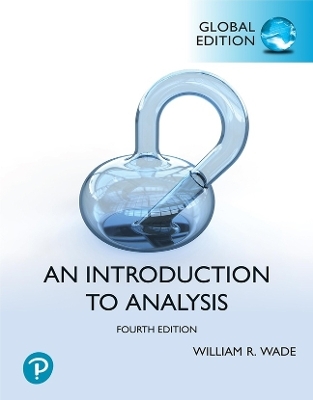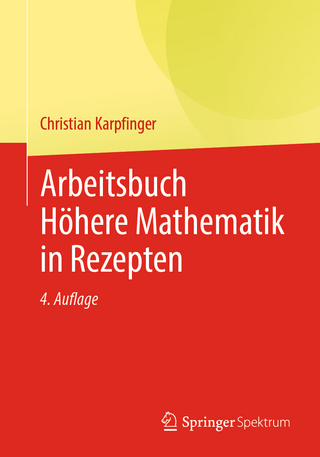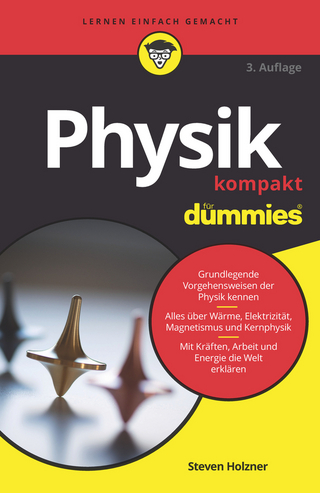
Introduction to Analysis, Global Edition
Pearson Education Limited (Verlag)
978-1-292-35787-4 (ISBN)
- Titel nicht im Sortiment
- Artikel merken
This title is part of the Pearson Modern Classicsseries.
This text prepares students for future coursesthat use analytic ideas, such as real and complex analysis, partial andordinary differential equations, numerical analysis, fluid mechanics, anddifferential geometry. This book is designed to challenge advanced studentswhile encouraging and helping weaker students. Offering readability,practicality and flexibility, Wade presents fundamental theorems and ideas froma practical viewpoint, showing students the motivation behind the mathematicsand enabling them to construct their own proofs.
William Wade received his PhD in harmonic analysis from the University of California—Riverside. He has been a professor of the Department of Mathematics at the University of Tennessee for more than forty years. During that time, he has received multiple awards including two Fulbright Scholarships, the Chancellor's Award for Research and Creative Achievements, the Dean's Award for Extraordinary Service, and the National Alumni Association Outstanding Teaching Award. Wade’s research interests include problems of uniqueness, growth and dyadic harmonic analysis, on which he has published numerous papers, two books and given multiple presentations on three continents. His current publication, An Introduction to Analysis,is now in its fourth edition. In his spare time, Wade loves to travel and take photographs to document his trips. He is also musically inclined, and enjoys playing classical music, mainly baroque on the trumpet, recorder, and piano.
Part I. ONE-DIMENSIONALTHEORY
1. The Real Number System
1.1 Introduction
1.2 Ordered field axioms
1.3 Completeness Axiom
1.4 Mathematical Induction
1.5 Inverse functions and images
1.6 Countable and uncountable sets
2. Sequences in R
2.1 Limits of sequences
2.2 Limit theorems
2.3 Bolzano-Weierstrass Theorem
2.4 Cauchy sequences
*2.5 Limits supremum and infimum
3. Functions on R
3.1 Two-sided limits
3.2 One-sided limits and limits atinfinity
3.3 Continuity
3.4 Uniform continuity
4. Differentiability on R
4.1 The derivative
4.2 Differentiability theorems
4.3 The Mean Value Theorem
4.4 Taylor's Theorem and l'Hôpital'sRule
4.5 Inverse function theorems
5 Integrability on R
5.1 The Riemann integral
5.2 Riemann sums
5.3 The Fundamental Theorem ofCalculus
5.4 Improper Riemann integration
*5.5 Functions of boundedvariation
*5.6 Convex functions
6. Infinite Series of Real Numbers
6.1 Introduction
6.2 Series with nonnegative terms
6.3 Absolute convergence
6.4 Alternating series
*6.5 Estimation of series
*6.6 Additional tests
7. Infinite Series of Functions
7.1 Uniform convergence ofsequences
7.2 Uniform convergence of series
7.3 Power series
7.4 Analytic functions
*7.5 Applications
Part II. MULTIDIMENSIONAL THEORY
8. Euclidean Spaces
8.1 Algebraic structure
8.2 Planes and lineartransformations
8.3 Topology of Rn
8.4 Interior, closure, and boundary
9. Convergence in Rn
9.1 Limits of sequences
9.2 Heine-Borel Theorem
9.3 Limits of functions
9.4 Continuous functions
*9.5 Compact sets
*9.6 Applications
10. Metric Spaces
10.1 Introduction
10.2 Limits of functions
10.3 Interior, closure, boundary
10.4 Compact sets
10.5 Connected sets
10.6 Continuous functions
10.7 Stone-Weierstrass Theorem
11. Differentiability on Rn
11.1 Partial derivatives andpartial integrals
11.2 The definition ofdifferentiability
11.3 Derivatives, differentials, andtangent planes
11.4 The Chain Rule
11.5 The Mean Value Theorem andTaylor's Formula
11.6 The Inverse Function Theorem
*11.7 Optimization
12. Integration on Rn
12.1 Jordan regions
12.2 Riemann integration on Jordanregions
12.3 Iterated integrals
12.4 Change of variables
*12.5 Partitions of unity
*12.6 The gamma function andvolume
13. Fundamental Theorems of VectorCalculus
13.1 Curves
13.2 Oriented curves
13.3 Surfaces
13.4 Oriented surfaces
13.5 Theorems of Green and Gauss
13.6 Stokes's Theorem
*14. Fourier Series
*14.1 Introduction
*14.2 Summability of Fourierseries
*14.3 Growth of Fouriercoefficients
*14.4 Convergence of Fourierseries
*14.5 Uniqueness
Appendices
A. Algebraic laws
B. Trigonometry
C. Matrices and determinants
D. Quadric surfaces
E. Vector calculus and physics
F. Equivalence relations
References
Answers and Hints to Selected Exercises
Subject Index
Notation Index
*Enrichment section
| Erscheinungsdatum | 25.10.2021 |
|---|---|
| Verlagsort | Harlow |
| Sprache | englisch |
| Maße | 178 x 236 mm |
| Gewicht | 1200 g |
| Themenwelt | Mathematik / Informatik ► Mathematik ► Algebra |
| Mathematik / Informatik ► Mathematik ► Analysis | |
| ISBN-10 | 1-292-35787-8 / 1292357878 |
| ISBN-13 | 978-1-292-35787-4 / 9781292357874 |
| Zustand | Neuware |
| Haben Sie eine Frage zum Produkt? |
aus dem Bereich


